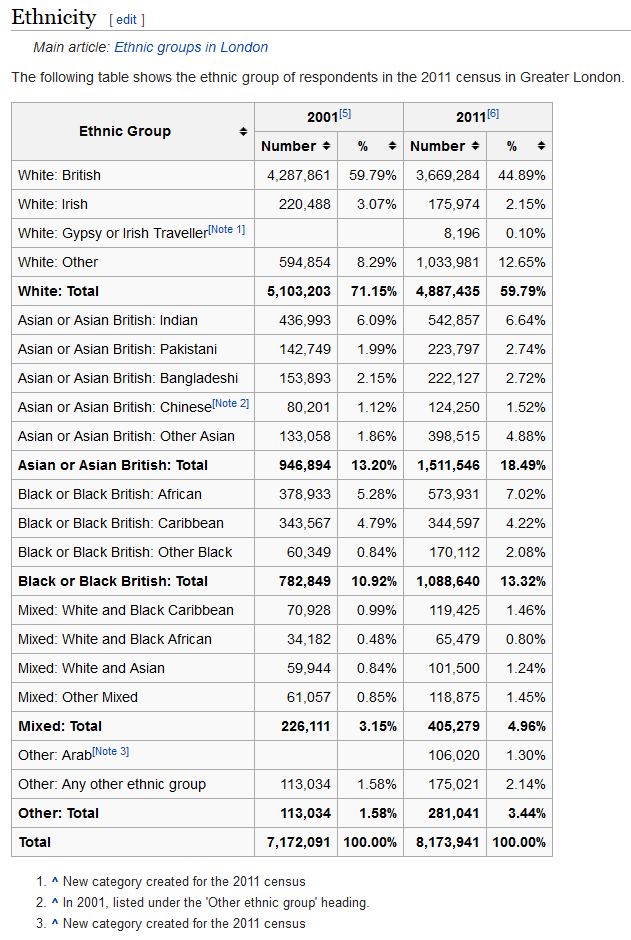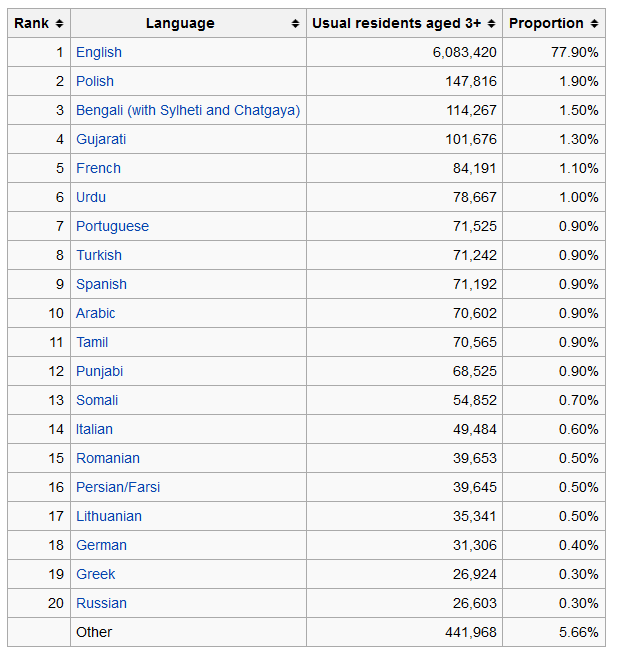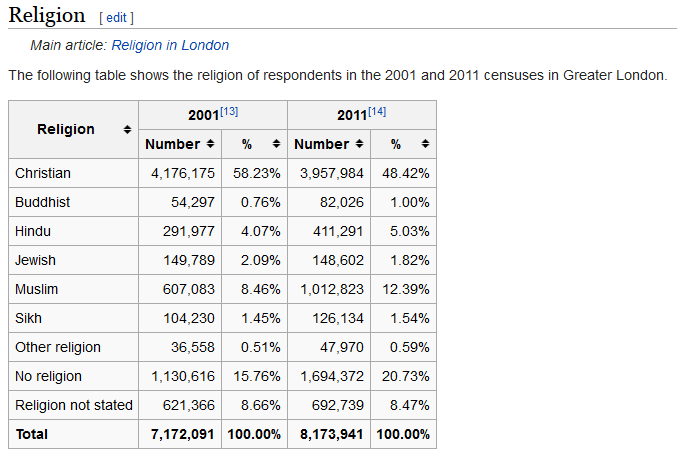Giuseppe Sandro Mela.
2016-05-08.

«Mr Khan is the city’s first Muslim mayor, after beating Tory Zac Goldsmith by 1,310,143 votes to 994,614»
*
A quanto potrebbe sembrare, tutti sarebbero esultanti.
Infatti:
– Londra è la capitale del Regno Unito, la più popolosa ed importante città di quello stato;
– Mr Sadiq Khan è un laburista;
– Mr Sadiq Khan è un mussulmano.
*
Prendiamo atto di tutti questi eventi e formuliamo l’augurio di buon lavoro, anche se vi sono voci fuori dal coro
«Britain has an extremist mayor!»
Vorremmo però richiamare l’attenzione del Lettore su un fatto di cui nessuno sembrerebbe essere voglioso di parlare.
Ma cosa è Londra?
Per la grande maggioranza delle persone Londra è la gloriosa capitale del Regno Unito, quel regno che ha saputo conquistarsi un impero mondiale, la città ove viveva ed agiva Mr. Churchill, dove erano vissuti Thomas Becket assassinato da Re Enrico II, Thomas More assasinato da Re Enrico VIII. Grandi uomini che fecero grande l’Inghilterra: persone disposte a morire pur di difendere fede, ideali e tradizione. Londra è sempre stata il polo motore dei britannici proprio perché generava ed allevava persone ben conscie dei propri doveri.
Bene, guardiamoci con attenzione le seguenti statistiche.




(1). La città di Londra aveva nel 2014 8,538,689 abitanti. Hanno votato 2,304,757 elettori (1,310,143 + 994,614). Anche tenendo conto degli altri candidati,che hanno raccolto ben poco in termini percentuali, e che questi dati sono a scrutinio di circa due terzi delle schede totali, la percentuale dei votanti è bassa. Sufficiente a rendere legale l’elezione, ma pur sempre pochini.
(2). A Londra, a tutto il 2011, la percentuale dei “britannici” assommava al 44.89% della popolazione totale. Ovviamente Londra è città cosmopolita, ma occorrerebbe prendere atto che la demografia londinese non permette di estrapolare i risultati di questa metropoli a tutto il Regno Unito. Londra formerebbe in altri termini un caso a sé stante.
(3). A riprova di quanto detto, il 77.90% della popolazione londinese è di lingua inglese.
(4). In Londra la percentuale dei cristiani arriva al 48.42%, ma sembrerebbe essere ragionevole pensare che solo una parte di essi siano praticanti.
*
Conclusioni.
– Sarebbe statisticamente scorretto estrapolare i risultati di Londra a tutto il Regno Unito.
– Non sembrerebbero esserci elementi che attestino come un Mayor mussulmano non dovrebbe curare gli interessi della metropoli che amministra.
– Dopo otto anni di amministrazione conservatrice, sembrerebbe essere una salutare norma di alternazione che oggi sia stato eletto un laburista. Senza alternanza sarebbe ben difficile poter parlare di democrazia.
– È del tutto naturale che una metropoli di cui si va perdendo la stirpe originaria si sia scelta come capo un ex-immigrato, integrato quanto si voglia nella forma inglese, ma dissimile dai britannici nella sostanza. E non sembrerebbe assolutamente un caso che Mr. Khan sia stato supportato dal Labour Party.
→ Bbc. 2016-05-07. Elections: Labour’s Sadiq Khan elected London mayor.
Sadiq Khan has been elected the new Mayor of London – boosting Labour after it slumped in Scotland’s elections.
*
Mr Khan is the city’s first Muslim mayor, after beating Tory Zac Goldsmith by 1,310,143 votes to 994,614.
The result bolsters leader Jeremy Corbyn after Labour was beaten into third in Scotland by the Tories and lost some English councillors.
In Scotland, the SNP said it would form a minority government after winning its third election in a row.
First Minister Nicola Sturgeon is celebrating what she said was an “emphatic” victory, her first as party leader, after the SNP emerged as the largest party at Holyrood with 63 seats, ahead of the Conservatives on 31 and Labour on 24.
But she played down talk of another independence referendum after falling short by two seats of an overall majority.
In Wales, Labour remains as the largest party, with 29 out of 60 seats, but was denied a majority as Plaid Cymru and UKIP both made notable gains. Counting is continuing in Northern Ireland.
Mr Khan’s victory – which gave him the largest personal mandate of any politician in UK history – ends eight years of Conservative control of City Hall. The former Labour MP and minister, 45, becomes London’s third mayor after Ken Livingstone and Boris Johnson.
In his victory speech, Mr Khan referred to his humble origins on a council estate and said he had never imagined that “someone like me could be elected as mayor of London,” promising to be a mayor “for all Londoners”.
He said the campaign had not been without controversy, but added: “I am so proud that London has today chosen hope over fear”.
He added that the “politics of fear is not welcome in our city”.
Campaign conduct.
BBC political correspondent Chris Mason said questions were now focusing on the tone of the Conservative campaign, which was criticised by some within the party and Labour for accusing Mr Khan of sharing a platform with Islamist extremists.
Defence Secretary Michael Fallon – who said during the election campaign that Mr Khan was unfit to be mayor – said it was legitimate to put a candidate under scrutiny.
“Both candidates were asked questions about their backgrounds, their personalities, their judgements, the people they associate with. That’s the nature of our democracy and the rough and tumble of politics,” he told BBC Radio 4 Today.
Mr Fallon repeatedly declined to say whether he thought Mr Khan was a security risk to London, instead saying: “London is safe with a Conservative government working with the new mayor of London.”
Asked if that would require a lot of work, he replied: “Yes, of course it does.”
→ Guardian. 2016-05-07. Sadiq Khan’s London mayoral win gives Jeremy Corbyn reason to be cheerful
Sadiq Khan’s election as London mayor in the early hours of Saturday handed a boost to Labour leader Jeremy Corbyn at the end of a difficult day in which Labour held ground in England but endured a disastrous defeat in its former heartland of Scotland.
Khan’s landslide victory over his rival, Conservative Zac Goldsmith, in which he secured more than 1.3m votes made him the first Muslim mayor of a major western capital, and gave Labour the keys to City Hall after eight years of Conservative control, following a bitterly fought and controversial campaign.
As the votes were being counted, senior Tories and even Goldsmith’s own sister criticised his team’s strategy, which included repeated claims from the candidate himself and David Cameron that Khan had shown bad judgment by sharing platforms with alleged extremists.
The former Conservative party chairman Sayeeda Warsi attacked the Goldsmith campaign on Twitter, claiming: “Our appalling dog whistle campaign for #LondonMayor2016 lost us the election, our reputation & credibility on issues of race and religion.”
Steve Hilton, Cameron’s former director of strategy who was part of an effort to “detoxify” the Tories, told BBC Newsnight that Goldsmith had brought back the “nasty party label to the Conservative party”.
Speaking after finally being declared winner after midnight, Khan said that he grew up on a council estate and “never dreamt that someone like me could be elected as mayor of London”.
He highlighted his positive campaign before making a pointed attack on Goldsmith. “I am so glad that London has chosen hope over fear and unity over division. The politics of fear is simply not welcome in our city.”
Goldsmith thanked his team and admitted he was disappointed but failed to address the accusations.
The row could be uncomfortable for the prime minister, who used the line of attack more than once in the House of Commons.
Jemima Goldsmith questioned the tactics, saying they did not reflect the “eco-friendly, independent-minded politician with integrity” she knew her brother to be.
But underlining the hostility the new mayor could face once he takes up office, the candidate for Britain First, Paul Golding, turned his back in protest as Khan made his acceptance speech at City Hall. “Britain has an extremist mayor!” shouted a member of Golding’s team.
Corbyn congratulated Khan at the end of a day of results across the UK that were not bad enough to trigger a coup against the Labour leader. He said he had defied the critics to hang on across England, where the party retained councils such as Crawley and Plymouth and had suffered a lower net loss than expected, of two dozen councillors.
“All across England last night we were getting predictions that Labour was going to lose councils. We didn’t, we hung on and we grew support in a lot of places,” Corbyn said in a defiant speech to activists in Sheffield.
In Scotland, however, Labour was pushed into third place by the Conservatives in a crushing defeat for a party that once dominated the political landscape north of the border. Corbyn said: “We are going to walk hand-in-hand with our party in Scotland to build that support once again.”
The leader’s positive take on the election results contrasted with a more cautious response from a series of shadow cabinet members who said that Labour had a long way to go before it was on track for a 2020 majority.
The shadow leader of the House, Chris Bryant, said Labour was not “match ready”, while the shadow Scottish secretary, Ian Murray, claimed that people did not see Corbyn’s Labour as a “credible party of future government”.
Other seized on the predictions of psephologists who said it was extremely unusual for a party in opposition to lose council seats at this stage of the electoral cycle.
Jo Cox and Neil Coyle, two new MPs who nominated Corbyn, wrote in the Guardian that they regretted their decision, warning that “weak leadership” risked keeping their party out of power until 2030.
Cameron hailed the Scottish result, saying he would not have believed it possible two years ago. He accused Labour of losing touch with working people by being “obsessed with their leftwing causes and unworkable economic policies”.
Dubbed “Super Thursday”, the day of elections across the UK saw:
- Labour achieving 31% of the vote share, just ahead of the Conservatives on 30%, according to a BBC forecast, based on how people had voted in England.
- The SNP losing its overall majority in the Scottish parliament but easily remaining the largest party with 63 seats, ahead of the Conservatives with 31 seats and Labour with 24.
- Labour remaining the dominant party in Wales, winning 29 out of 60 seats, but losing its minister Leighton Andrews to the Plaid Cymru leader, Leanne Wood. Ukip also won seven seats in Wales.
- The polling analyst John Curtice suggested the results would translate into 301 Tory MPs in a general election, short of a majority, with Labour on 253.
- The Liberal Democrats made progress, taking control of Watford council and gaining seats elsewhere in the country.
But the main focus of the day was on Labour’s performance, after a week in which Corbyn had been plunged into controversy over antisemitism claims that resulted in a series of suspensions, including Ken Livingstone.
The Labour leader’s allies hailed the outcome, with the shadow chancellor, John McDonnell, and the shadow communities secretary, Jon Trickett, calling on critics of the leadership to “put up or shut up”.